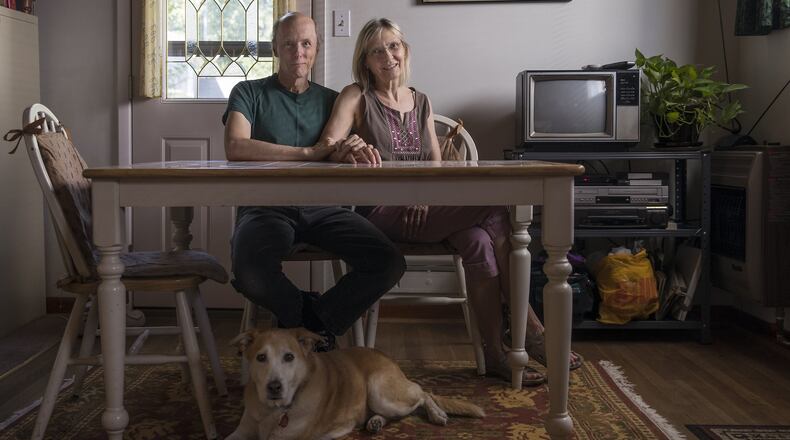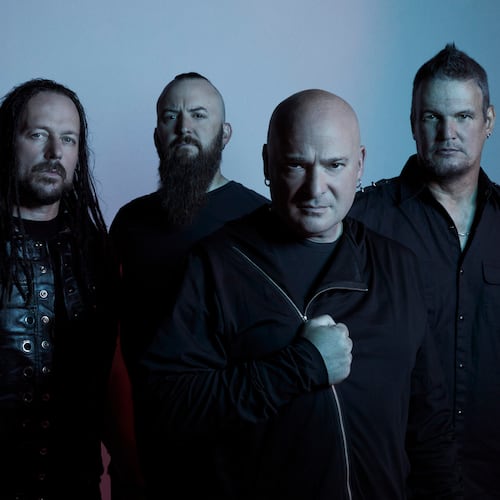The lore around legendary guitarist Glenn Phillips is familiar to those knowledgeable about Atlanta's rock history.
He was a cofounding member in 1967 of the Hampton Grease Band, a band way ahead of its time, fronted by the charismatic Bruce Hampton. They reportedly made one of the worst-selling albums in the history of Columbia Records, but when it was re-released by Sony in 1996, it received high critical praise and was cited as influential by jam bands like Phish and Widespread Panic. During its heyday, the band played with the likes of the Allman Brothers Band and the Grateful Dead.
As a solo artist, Phillips recorded with Virgin Records and received four-star reviews in Rolling Stone, which famously said about him, “If rock ‘n’ roll guitarists were kamikaze pilots, Glenn Phillips would be in heaven right now.”
Phillips began his solo career with the 1975 release of “Lost at Sea,” a lush, expressive instrumental album he produced following the death of his father, who committed suicide on his 50th birthday when Phillips was 23. Since then, Phillips has produced more than a dozen solo records, many from his home studio in Brookhaven.
But what some people might not know about Phillips is that for much of his adult life, he suffered from debilitating panic attacks triggered by medical procedures as simple as drawing blood or a prostate exam. Even the suggestion of a procedure could prompt an attack so severe, he would have a seizure. But through a combination of reading, talking to friends and family, including his wife of 35 years, Katie, and a lot self-reflection, Phillips, 69, was able to identify the source of his anxiety and eradicate his panic attacks.
In hopes of helping others who suffer from the same disorder, Phillips has published a memoir about his experience called “Echoes: The Hampton Grease Band, My Life, My Music and How I Stopped Having Panic Attacks.” The book gives a behind-the-scenes look at Atlanta’s embryonic rock scene and the unique career of a musician that Little Feat’s Lowell George called “the most amazing guitarist I’ve ever heard.” It also explores the all-t0o-human struggles of a man determined to do things his own way and who makes some mistakes along the way but eventually learns from them.
Along with the book, Phillips has produced a new album called “The Dark Parade.” He’ll mark the release of the book, the CD and a DVD of a live “Lost at Sea” 40th-anniversary show recorded in 2015 with a performance on Saturday at Red Clay Music Foundry in Duluth.
Phillips recently spoke with to the AJC about his life and career.
AJC: Stories about the Allman Brothers and the Grateful Dead playing free shows in Atlanta's Piedmont Park in the late '60s are legendary. Who knew you were the one who discovered the live electrical outlet in the gazebo and first started playing there with the Hampton Grease Band?
Phillips: I was the first in that I went down and found an outlet and plugged a clock radio into it (to see if it worked) because the band was having a problem finding a place to play. But the thing that really made those such big events was not me or the Grease Band or any one band; it was a community experience. What made it grow was the Great Speckled Bird, which became very involved in writing about those events, and the community of people.
AJC: When Bruce Hampton died during his 70th birthday tribute show at the Fox Theatre in 2017, he was estranged from the other members of the Hampton Grease Band. In the book, you attribute the division to Hampton claiming credit for other musicians' contributions to the band. What was going on there?
Phillips: I think Bruce was a very talented guy, very admired by many people, including me and the people who played in the band with him. But I think Bruce always carried a feeling of inadequacy. I think he always felt like he wasn't enough, and that led to this mythmaking storytelling. The further that went, the more uncomfortable he felt being around the people who knew that wasn't the reality. I feel incredibly grateful that before he passed away, we were able to do a reunion show, and it was great. My personal feeling is Bruce didn't need the myth. He was more than enough without the myth.
AJC: You've been expressing yourself musically for 50 years. What was it like expressing yourself on the printed page?
Phillips: It was very helpful to write this stuff down and set it aside, oftentimes for years, then go back and read it. I often would see things about myself and my upbringing that I didn't see before. When I initially wrote those panic attack stories that take place earlier in the book, I had no idea what was going on with that. It was as if I had written a mystery novel, but I hadn't solved the mystery. From the time my father killed himself and I made "Lost at Sea," to the time when that record was re-issued and I did the "Lost at Sea" reunion show, 40 years had passed, and that's how long it took me to figure out what was going on.
AJC: In the book, you eventually recognize the connection between your panic attacks and your father's suicide. How did you come to that realization?
Phillips: Before I left home when I was 18, I had to have four impacted wisdom teeth [taken] out. I wrote the story in the book because it was something I felt guilty about because I did it right before I left so I wouldn't have to pay for it. I had to go to the hospital to do it.
Throughout my life, I had wondered why I freaked out about going to the doctor, and people would ask, “Did you ever had a bad experience at the doctor,” and I couldn’t think of one.
In going back and editing the book, I looked at that story and I said, “Wait a minute. I was 18. I went into the hospital, and I remember joking with everybody about it and having no anxiety at all.” A few years after that is when my father killed himself and I realized, 40 years later, that’s when I had the first panic attack. It was there in front of my face, and I didn’t see it. Anxiety is rarely about what you think it’s about.
AJC: You're launching your book on the same day you're releasing your new CD, "Dark Parade." Are they thematically linked?
Phillips: Records are the soundtrack of my life — writing the book, the realization that took place over a course of years, it's all tied in with that music. There's a song at the end of "Dark Parade" called "If Only." It's about all those old feelings of regret and guilt and seeing it from a different perspective and realizing you don't have the power to change the past, but you do have the power to look at things differently and change the future.
Questions and answers have been edited for length and clarity.
CONCERT PREVIEW
Glenn Phillips. 7:30 p.m. Saturday, Sept. 14. $18-$20 advance, $22-$25 at the door. Red Clay Music Foundry, 3116 Main St., Duluth. 404-478-2749, eddieowenpresents.com.
About the Author
Keep Reading
The Latest
Featured




